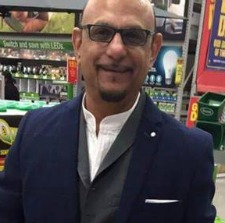Aspi S. Divecha

My father passed away on December 22, 2015. He was 60 years old. He was a diabetic, but overall very healthy. My brother is having his first child in March 2016, making my father a first time grandfather. My wedding is coming up in 2017 making him the father of 2 married sons. He had a lot to look forward to.
He came home from a weekend away with what appeared to be stomach flu-like symptoms. He threw up a few times, and suffered from loose motions. A few days went by and he appeared to be better. He returned to work (he owned a fashion jewelry store in downtown Toronto called Vivid Jewelry). By Friday December 11th, he began showing signs of a fever, and his nausea returned. We had taken him to the hospital, where they drew some blood and put him on IV drips to rehydrate him. The doctor came back and advised us that he is simply severely dehydrated and the fluids should help him feel better and overcome this stomach flu. He prescribed my father novomorphone (extremely aggressive – causes reduced immunity, and organ damage – specifically kidneys and liver). That night my father took 2 pills as prescribed and began showing signs of delirium. He became weak enough to need assistance from my brother and me to lift him to the washroom to simply urinate. We called the emergency as advised and they said that he needs to get bed rest.
Two days later on Sunday December 13th 2015, we decided that enough was enough and we called an ambulance to take him back to the hospital. The paramedic that arrived made the determination that what he had was not a stomach flu and was overly concerned that there was significant damage done to my father’s heart. She immediately connected him to an ECG and gave him a few sprays of Nitro to open his arteries.
Back at the same hospital my father went to earlier, they could not determine what was wrong. They drew more blood, and also 2 larger vials to culture. They called in a cardiologist from a second hospital, and he determined that my father had pericarditis (inflammation of the pericardium). The specialist mentioned sepsis, however the first hospital disregarded his recommendation. The cultures came back with a very aggressive strain of Staphylococcus aureus.
My father was transferred to the ICU and placed into isolation while the infection was present and to monitor his heart condition. An entire 48 hours had passed before we received any kind of update from the doctor. The update we were provided was what we already knew, that he has staph, and it isn’t getting any better.
By Wednesday December 16th 2015, the doctor made the determination that the infection has reached his heart, and that the first hospital was no longer capable of handling his case. Early Thursday December 17th 2015, my father was air lifted to a different hospital on the assumption that he required emergency open heart surgery to salvage the heart. At that hospi tal, my father took my hand… in 27 years of my life, my father never admitted to fear. In this moment he squeezed my hand and told me that he is scared, that he sees his brothers, and parents who have left this earth, and that he would join them. I lied to my father… I said “No dad… not today… Not here, not like this. You will be ok!” (little did I know that this lie was the last time I spoke to my father)
tal, my father took my hand… in 27 years of my life, my father never admitted to fear. In this moment he squeezed my hand and told me that he is scared, that he sees his brothers, and parents who have left this earth, and that he would join them. I lied to my father… I said “No dad… not today… Not here, not like this. You will be ok!” (little did I know that this lie was the last time I spoke to my father)
The hospital took one look at my father and determined he has already progressed to severe sepsis and immediately sedated, ventilated, and got my father started on the correct treatment for sepsis.
By Friday December 18th 2015, my father’s kidneys had completely shut down and was showing significant evidence that his liver had been shutdown for over 72 hours by this point. The sepsis was progressing very aggressively. The infection had spread to his heart and he had developed endocarditis. They needed to replace his mitral valve before the infection completely destroyed his heart. Unfortunately due to the sepsis, his blood pressure, and lungs were not cooperating and surgery would have killed him. They made the collective decision to hold off surgery as long as possible in the hopes of getting the sepsis under control. By Sunday December 20th 2015, the surgeon and the team of specialists decided that surgery would happen within the next 24 hours, not because his sepsis was coming under control, but because the mitral valve was close to failure.
Monday December 21st 2015, they began open heart surgery on my father. For 11 hours we received no update. Our interpretation of this was that “no news, is good news.” When the surgeon finally came to speak with us, he first apologized for the lack of updates, and explained that the surgery was successful, but with great difficulty. Because my father’s platelets were so low, and due to his diabetes, his blood was not clotting during surgery. The surgeon said it took them 4 hours just to bring his blood pressure, and blood count back to a stable number before the blood began clotting. Due to the significant trauma to my father’s body, a large amount of inflammation and swelling occurred causing his abdomen to put too much pressure on his diaphragm. My father was only accepting 20% of oxygen into his lungs. Right after the 11 hour open heart surgery, they needed to perform a second procedure to relieve that pressure on his abdomen. Both surgeries were successful, and my father appeared to be on the road to recovery.
Tuesday December 22nd 2015, the surgeon advised us that that our father was very sick. He told us that he only has a 20-30% chance at survival. Still, we were very hopeful as we were made to understand that surgery was the hardest part. By this point his blood pressure was stable at 70/60 – low, but not dipping lower. They decided to decrease the amount of dialysis he was receiving to try and drive that blood pressure up a little higher. Unfortunately, that did not work. His pressure kept dropping, and then the worst possible scenario occurred.
Because of the large amount of swelling, my father’s chest, and abdomen was left open after surgery, the chest started bleeding. Again, they were unable to clot him causing a significant amount of blood loss. They had to give him 2 transfusions to bring his blood count back up. Because of the blood loss, his pressure had dropped to 53/44. His pressure was so low, his heart started to fibrillate (one side of the heart was pumping harder than the other to compensate for the low blood pressure). Around 8 PM the doctor told me that my father was hanging on by a thread, and that they need to give him one more transfusion to bring his blood pressure and blood count up. He advised that his heart would probably not survive this transfusion and that we should stick around for the next few hours.
At 10:40pm we got a call that our family could come in. My biggest fear was that this was it. The doctor advised us that my father had minutes left. His heart was failing, and because his chest was open, they could not defibrillate him. There was nothing we could do but stand around him while his heart experienced its eventual failure. 10:51pm December 22nd 2015, we had lost our father, and our best friend.
If the lack of awareness around sepsis was recognized, the original hospital would not have dismissed the cardiologist’s recommendation that he was septic as if it was a myth.
We lost a great man, a man who only believed in being a great human being to a disease that we don’t accept as an epidemic… RIP Dad… I’m sorry that all I could do was watch as you quickly fell to your demise.
Source: by Neville Divecha (Aspi's son)






























